形容词副词考点分析
形容词副词讲义(精选.)

形容词副词定义:中文的意思是“……的”的词是形容词,用来修饰名词;中文意思是“……地”的词是副词,用来修饰动词、形容词或副词形容词与副词在句中的位置形容词形容词的比较级在句中的位置名词所有格副词的比较级形容词副词的转换考点清单练习:练习①It is a ____(sun) day.②It is a _____(rain) day.③I think you are a _____(luck) girl.④The teacher said he had _____to tell us.A. anything importantB. important anythingC. something importantD. important something⑤Look !Jack is ____(excite,excited) .⑥I feel ____(happy) every day.⑦The baby is sleeping ,please keep______(quiet,quietly)考点二:形容词的比较级(1)在形容词词尾加上“er”“est”构成比较级、最高级:bright(明亮的)—brighter—brightest broad(广阔的)—broader—broadest cheap(便宜的)—cheaper—cheapest clean(干净的)—cleaner—cleanest clever(聪明的)—cleverer—cleverest cold(寒冷的)—colder—coldestcool(凉的)—cooler—coolest dark(黑暗的)—darker—darkest dear(贵的)—dearer—dearest deep(深的)—deeper—deepestfast(迅速的)—faster—fastest few(少的)—fewer—fewestgreat(伟大的)—greater—greatest hard(困难的,硬的)—harder—hardest high(高的)—higher—highest kind(善良的)—kinder—kindestlight(轻的)—lighter—lightest long(长的)—longer—longestloud(响亮的)—louder—loudest low(低的)—lower—lowestnear(近的)—nearer—nearest new(新的)—newer—newestpoor(穷的)—poorer—poorest quick(快的)—quicker—quickest quiet(安静的)—quieter—quietest rich(富裕的)—richer—richestshort(短的)—shorter—shortest slow(慢的)—slower—slowestsmall(小的)—smaller—smallest smart(聪明的)—smarter—smartest soft(柔软的)—softer—softest strong(强壮的)—stronger—strongest sweet(甜的)—sweeter—sweetest tall(高的)-taller-tallestthick(厚的)—thicker—thickest warm(温暖的)—warmer—warmest weak(弱的)—weaker—weakest young(年轻的)—younger—youngest (2).双写最后一个字母,再加上“er”“est”构成比较级、最高级:big(大的)—bigger—biggest fat(胖的)—fatter—fattesthot(热的)—hotter—hottest red(红的)—redder—reddestsad(伤心的)—sadder—saddest thin(瘦的)—thinner—thinnestwet(湿的)—wetter—wettest mad(疯的)—madder—maddest(3).以不发音的字母e结尾的形容词,加上“r”“st”构成比较级、最高级:able(能干的)—abler—ablest brave(勇敢的)—braver—bravest close(接近的)—closer—closest fine(好的,完美的)—finer—finest large(巨大的)—larger—largest late(迟的)—later—latestnice(好的)—nicer—nicest ripe(成熟的)—riper—ripestrude(粗鲁的)—ruder—rudest safe(安全的)—safer—safeststrange(奇怪的)—stranger—strangest wide(宽广的)—wider—widestwise(睿智的,聪明的)—wiser—wisest white(白的)—whiter—whitest(4).以字母y结尾的形容词,把y改为i,再加上“er”“est”构成比较级、最高级:busy(忙碌的)—busier—busiest dirty(脏的)—dirtier—dirtiestdry(干燥的)—drier—driest early(早的)—earlier—earliesteasy(容易的)—easier—easiest friendly(友好的)—friendlier—friendliest funny(好玩的)—funnier—funniest happy(开心的)—happier—happiest healthy(健康的)—healthier—healthiest heavy(重的)—heavier—heaviesthungry(饿的)—hungrier—hungriest lazy(懒惰的)—lazier—laziestlucky(幸运的)—luckier—luckiest naughty(调皮的)—naughtier—naughtiest noisy(嘈杂的)—noisier—noisiest pretty(美丽的)—prettier—prettiestsilly(傻的)—sillier—silliest spicy(辣的)—spicier—spiciestthirsty(渴的)—thirstier—thirstiest ugly(丑的)—uglier—ugliest(5).双音节、多音节形容词,在单词前面加上“more”“most”构成比较级、最高级:afraid(害怕的)—more afraid—most afraidbeautiful(美丽的)—more beautiful—most beautifulcareful(仔细的)—more careful—most carefulcheerful(开心的)—more cheerful—most cheerfulcrowded(拥挤的)—more crowded—most crowdeddangerous(危险的)—more dangerous—most dangerousdelicious(美味的)—more delicious—most deliciousdifficult(困难的)—more difficult—most difficultexciting(令人兴奋的)—more exciting—most excitingexpensive(昂贵的)—more expensive—most expensivefamous(著名的)—more famous—most famousfrightened(受惊的)—more frightened—most frightenedfrightening(令人害怕的)—more frightening—most frighteninghard-working(勤奋的)—more hard-working—most hard-workinghelpful(有帮助的)—more helpful—most helpfulhonest(诚实的)—more honest—most honestimportant(重要的)—more important—most importantinteresting(有趣的)—more interesting—most interestingpolite(有礼貌的)—more polite—most politeterrible(可怕的)—more terrible—most terribletired(累的)—more tired—most tired(6).不规则变化的形容词:bad(坏的)—worse—worst far(远的)—farther—farthest (far—further—furthest) good(好的)—better—best ill(病的)—worse—worstlittle(少的)—less—least many(多的)—more—most much(多的)—more—most old(年老的)—older—oldest ( old—elder—eldest) well(好的,身体好的)—better—best练习1. Is your friend ____ (young) than you ?2. Shanghai is one of ______ (big) cities in the world.3. Do you think English is _____important than maths。
形容词和副词用法总结归纳讲解

C.especiallyD.luckily
12._____, the thief didn’t take anything valuable but my notebook.
A. Strange it isB. To be strange
C. Strangely enoughD. It was strange
C. surprisinglyD. hardly
4.—What do you think of the plan?
—I feel_____that we ought to give it up at once.
A. strongB. stronger
C. stronglyD. it strong
5.【1993全国】She doesn’t speak_____her friend, but her written work is excellent.
Watch hite意思是“晚”;lately意思是“最近”。如:
What have you been doing lately?
3.deep与deeply
deep意思是“深”,表示空间深度;deeply时常表示感情上的深度,“深深地”。如:
He pushed the stick deep into the mud.
8._____, he didn’t fail in the exam.(luck)
9.He was _____ ill and I was _____ sorry for that. (terrible)
10.It was _____ (extreme) cold that day and the meeting was _____ (especial) important.
高考英语复习形容词和副词知识点讲解讲义(必考点)
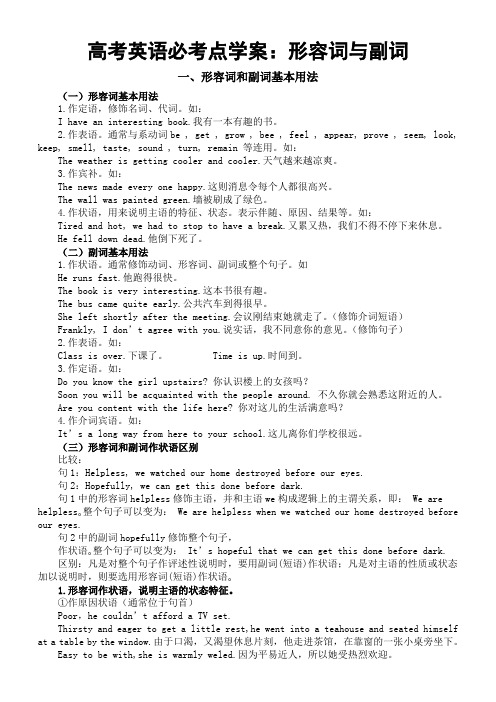
高考英语必考点学案:形容词与副词一、形容词和副词基本用法(一)形容词基本用法1.作定语,修饰名词、代词。
如:I have an interesting book.我有一本有趣的书。
2.作表语。
通常与系动词be , get , grow , bee , feel , appear, prove , seem, look, keep, smell, taste, sound , turn, remain 等连用。
如:The weather is getting cooler and cooler.天气越来越凉爽。
3.作宾补。
如:The news made every one happy.这则消息令每个人都很高兴。
The wall was painted green.墙被刷成了绿色。
4.作状语,用来说明主语的特征、状态。
表示伴随、原因、结果等。
如:Tired and hot, we had to stop to have a break.又累又热,我们不得不停下来休息。
He fell down dead.他倒下死了。
(二)副词基本用法1.作状语。
通常修饰动词、形容词、副词或整个句子。
如He runs fast.他跑得很快。
The book is very interesting.这本书很有趣。
The bus came quite early.公共汽车到得很早。
She left shortly after the meeting.会议刚结束她就走了。
(修饰介词短语)Frankly, I don’t agree with you.说实话,我不同意你的意见。
(修饰句子)2.作表语。
如:Class is over.下课了。
Time is up.时间到。
3.作定语。
如:Do you know the girl upstairs? 你认识楼上的女孩吗?Soon you will be acquainted with the people around. 不久你就会熟悉这附近的人。
小升初英语复习:形容词、副词

(1) “A + be +形容词比较级+ than + B”意思为“A比B更……”。
如:My pen is cheaper thanyours . 我的笔比你的便宜。
Tom runs faster thanyou. 汤姆比你要跑得快。
(2) 进行选择性比较时,可用“which/ who+be+形容词比较级,A or B ?”表示“A和B中,哪一个/ 谁更……..?”。
如:Who is taller (tall), Lucy or Lily? 露西和丽莉谁更高?(3) “比较级 + and + 比较级”或“more and more +原级”表示“越来越……”如:It becomes warmer and warmer when spring comes.春天来了,天气变得越来越暖和了。
(4) “the +比较级……, the+比较级......”,表示“越……越……”如:The more money you make, the more you spend.钱你赚得越多,花得越多。
温馨提示:a bit, a little, much, a lot, still, even 可修饰形容词或者副词的比较级。
Peter is much taller(tall) than Daming. 彼得比大明高得多。
(三) 最高级用法形容词、副词的最高级形式主要用来表示三者或三者以上人或事物的比较,表示“最……”的意思。
句子中有表示范围的词或短语。
如:of the three, in our class等。
结构:(1) Who + be + the + 形容词最高级,A, B or C? 表示“ABC中谁最…..?”Who is the most beautiful (beautiful)girl, Lily, Lucy or Lingling?丽莉、露西和玲玲谁是最漂亮的?(2) Which + be + the + 形容词最高级,A, B or C? 表示“ABC中哪一个最…..?”Which bag is the heaviest(heavy), the yellow one, the red one or the black one?哪个包包最重,黄色的,红色的还是黑色的?(3) A + 谓语 + the + 形容词/副词最高级 + 表示范围的短语(of/ in…) .表示“A在哪一范围内是最…..?”如:He is the tallest (tall) in our class. 他在我们班里是最高的。
八年级上册语法——形容词和副词

考点知识精讲
类别
单音 节词 和少 数双 音节 词
构成方法
一般直接加er,est
不发音的e结尾时加r,st 辅音字母加y结尾时把y变i,
再加பைடு நூலகம்r,est
重读闭音节结尾并且只有一 个辅音字母时,双写最后的
辅音字母,再加er,est
原级 new,tall late,fine easy happy
thin hot
中考英语语法 专题课件
专题5 形容词、副词
考点知识精讲
知识网络
形容词的用法:作定语、作表语
形容词和副词副词的用法修表饰示形频容度词的、副副词词
修饰动词
考点知识精讲
单音节词 形容词、副词比较等级的构成多音节词 不规则变化 形容词、 as+原级+as 副词的原级no+as/so+原级+as
比较级
最高级
newer taller
newest tallest
later finer latest finest
easier happier
easiest happiest
thinner hotter
thinnest hottest
多音
节词
和部 分双
在原级前加more,most
音节
词
popular important
考点知识精讲
8.一些表示情感的表语形容词后可接动词不定式。如:
glad,happy,pleased sorry,sad,sure,keen beready,afraid,able easy,difficult
+to do sth.
9.常见形容词的近义词归类。
large—big,glad—happy/pleased,clever—bright,
备战2020年高考英语考点06形容词和副词(含解析)(最新整理)
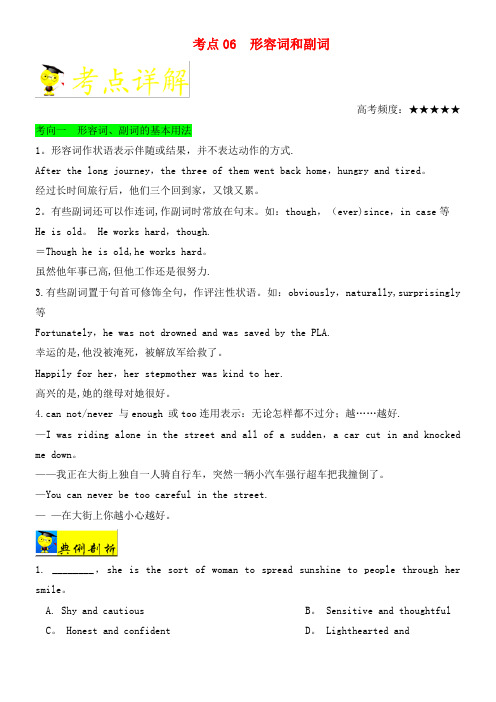
考点06 形容词和副词高考频度:★★★★★考向一形容词、副词的基本用法1。
形容词作状语表示伴随或结果,并不表达动作的方式.After the long journey,the three of them went back home,hungry and tired。
经过长时间旅行后,他们三个回到家,又饿又累。
2。
有些副词还可以作连词,作副词时常放在句末。
如:though,(ever)since,in case等He is old。
He works hard,though.=Though he is old,he works hard。
虽然他年事已高,但他工作还是很努力.3.有些副词置于句首可修饰全句,作评注性状语。
如:obviously,naturally,surprisingly 等Fortunately,he was not drowned and was saved by the PLA.幸运的是,他没被淹死,被解放军给救了。
Happily for her,her stepmother was kind to her.高兴的是,她的继母对她很好。
4.can not/never 与enough 或too连用表示:无论怎样都不过分;越……越好.—I was riding alone in the street and all of a sudden,a car cut in and knocked me down。
——我正在大街上独自一人骑自行车,突然一辆小汽车强行超车把我撞倒了。
—You can never be too careful in the street.——在大街上你越小心越好。
1. ________,she is the sort of woman to spread sunshine to people through her smile。
A. Shy and cautious B。
高考英语考点精析复习讲义-形容词副词

第四讲形容词和副词典型例题1.从几年来收集到的题目中可以看出高考对形容词和副词的考查主要集中在以下两点:(1)形容词的比较级和最高级;(2)在具体语境中辨析形容词和副词语义。
另外,考查形容词作定语时的语序问题的试题也不少。
2.对于比较级的考查,淡化结构,注重深层语义。
“比较”的意思并不是直接能从“结构”中看出来的,而是从语句的深层意义中挖掘出来的。
3.在加强考查词义辨析的题目中,高考不但加强了对语义的考查(而不仅仅是语法),随着新教材词汇量的增大,而且注重对词汇扩展能力的考查。
应试同分瓶颈要做好各类有关形容词和副词的试题应从这几方面去努力:1.对单音节形容词和副词的比较级和最高级的构成、双音节和多音节的形容词及副词的比较级和最高级的构成,要加强记忆、找出其中规律;灵活掌握修饰比较级和最高级的副词和一些短语。
2.对某些副词的词义还需进一步认识,多数形容词在加-ly后,词义基本不变,而有些则不同,如:hard—hardly.3.加强形容词、副词比较级考点的学习与应用,尤其是比较级在某些特定结构中的特殊含义,比较级及其修饰语的搭配和用法。
巧记名词前多个形容词的排列顺序,形容词、副词等在不同语境下的辨析,要不断地提高分析试题的能力,克服思维定势,灵活运用所学的知识。
(1)加强对比较级和最高级表达法的学习,尤其是一些常见的句型,要做到张口能诵的程度。
在理解上,不能留任何疑点。
(2)加强对形容词和副词的词义和用法的学习,要做到“词不离句,句不离义”。
做题时,要结合语境,注意惯用法和固定搭配认真辨析从而做出最佳选择。
(1)判断句子成分,如果是作定语、表语等,一般是用形容词;如果是作状语、修饰谓语动词或形容词和副词,一般应用副词。
但注意也有特殊情况,如形容词(短语)可作伴随或结果状语。
(2)分清句子结构,看看该句应该用原级、比较级还是最高级。
(3)注意特殊的含有形容词比较级的句型。
◎命题点1 形容词◎命题点2 副词命题点l 形容词本类考题解答锦囊:形容词的考查注意以下几点:1.表示倍数的三个句型:①times as+形容词原级+asThis table is 3 times as big as that one.②times the+性质名词+ofThis table is 3 times the size of that one.③times+形容词比较级+thanThis table is twice bigger than that one.2.多个形容词作定语时的排列顺序如果两个以上的形容词修饰一个名词时,与被修饰的名词关系较密切的形容词靠近名词;如果几个形容词的密切程度差不多,则音节少的形容词在前,音节多的在后。
语法专讲形容词和副词

(3)表示“A是B的……倍”时,用“A…+倍数+as+形容词原级+as+B”结构。 (一次:once,两次:twice,三次以上:数字+times) e.g. Our school is three times as big as theirs.
我们学校是他们学校的三倍。 This table is twice as long as that one. 这张桌子是那张桌子的两倍长。
(六)使用形容词时易混知识 1.-ing形容词和-ed形容词
-ing形容词
surprising令人惊讶的 interesting有趣的 exciting令人兴奋的 pleasing令人愉快的 frightening令人恐惧的 moving令人感动的 tiring使人疲倦的
-ed形容词
例句
surprised感到惊讶的
Mary是双胞胎中的高个子。
6.表示“越来越……”,用比较级重叠结构,即“比较级+and+比较级”, 多音节词和部分双音节词时用“more and more+形容词原级”。 e.g. It’s getting warmer and warmer in spring.
春天,天气变得越来越暖和。 Our hometown is becoming more and more beautiful. 我们的家乡越来越漂亮了。 7.表示“越……就越……”时,用“the+比较级,the+比较级”结构。 e.g. The more we get together, the happier we’ll be.
一、考点解读
中考对于形容词,副词的考查集中在原级、比较级和最高级的基本句型上,
高考英语形容词和副词在语法填空和改错题中的6个考点
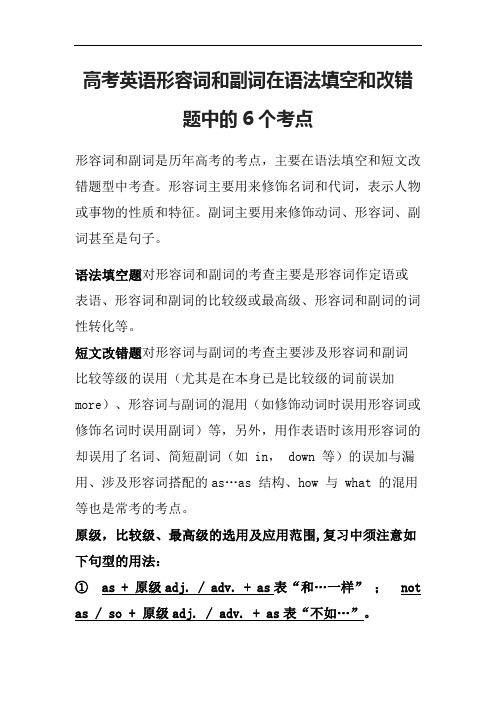
高考英语形容词和副词在语法填空和改错题中的6个考点形容词和副词是历年高考的考点,主要在语法填空和短文改错题型中考查。
形容词主要用来修饰名词和代词,表示人物或事物的性质和特征。
副词主要用来修饰动词、形容词、副词甚至是句子。
语法填空题对形容词和副词的考查主要是形容词作定语或表语、形容词和副词的比较级或最高级、形容词和副词的词性转化等。
短文改错题对形容词与副词的考查主要涉及形容词和副词比较等级的误用(尤其是在本身已是比较级的词前误加more)、形容词与副词的混用(如修饰动词时误用形容词或修饰名词时误用副词)等,另外,用作表语时该用形容词的却误用了名词、简短副词(如 in, down 等)的误加与漏用、涉及形容词搭配的as…as 结构、how 与 what 的混用等也是常考的考点。
原级,比较级、最高级的选用及应用范围,复习中须注意如下句型的用法:①as + 原级adj. / adv. + as表“和…一样” ;not as / so + 原级adj. / adv. + as表“不如…”。
例如:John plays football as well as David.Tom does not play the piano so/as well as Jack.The violin in the other shop will be cheaper, but not as good.②as + 原级adj. + a(n) + n. + as表“跟…一样”。
例如:It’s believed that teaching is as much an art as it is a science.Our neighbor has as big a house as ours.③比较级 + than表“比…更” ;less+原级+ than表“不如…”。
例如:This year they have produced less grain than they did last year.This road is wider than that one.④the + 比较级, the + 比较级,表示“越…,就会越…”。
初中英语形容词和副词(含解析)
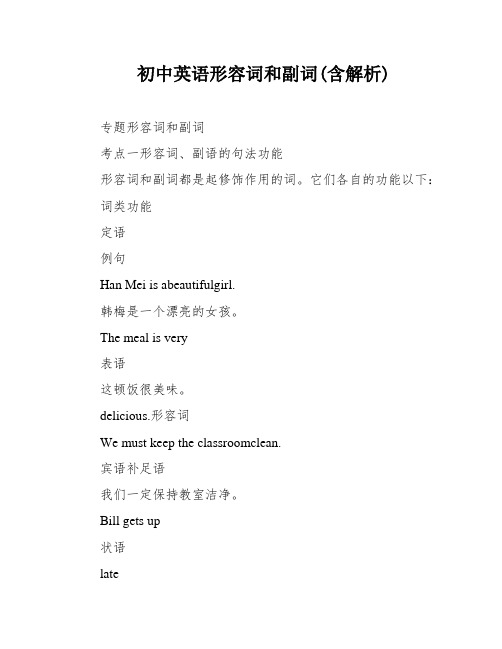
初中英语形容词和副词(含解析)专题形容词和副词考点一形容词、副语的句法功能形容词和副词都是起修饰作用的词。
它们各自的功能以下:词类功能定语例句Han Mei is abeautifulgirl.韩梅是一个漂亮的女孩。
The meal is very表语这顿饭很美味。
delicious.形容词We must keep the classroomclean.宾语补足语我们一定保持教室洁净。
Bill gets up状语lateon weekends.比尔在周末起得晚。
Lifehereis rich and interesting.副词后置定语这里的生活既富饶又风趣。
Class is表语放学了。
考点二描述词的摆列序次许多学生对怎样摆列形容词的词序颇感疑惑。
over.在此,我们向同砚们引见一个简朴的影象办法。
请你记住“限观形龄色国材”,假设这几个字欠好记,你就记“县官行令谢国财”。
口诀申明代表限制词,包含冠词、指示代词、例词the,this,that,my,Tom's,two词等。
县(限)形容词性物主代词、名词全部格、数官(观)代表见地的描画性描述词。
fine,beautiful,interesting代表表示大小、长短、高低及形状的行(形)small,tall,high,round描述词。
令(龄)代表年纪、新旧的形容词。
谢(色)代表颜色的形容词。
国代表国籍、地域、出处的形容词(或young,old,newred,black,whiteEnglish,名词)。
American财(材)代表中心名词组成资料的形容词。
wooden,stone,plasticThere is a fine old stone bridge near the village.村庄邻近有一座漂亮的古代石桥。
I bought a cheap blue plastic pencil box yesterday.昨天我买了一个廉价的蓝色塑料铅笔盒。
语法——形容词及副词
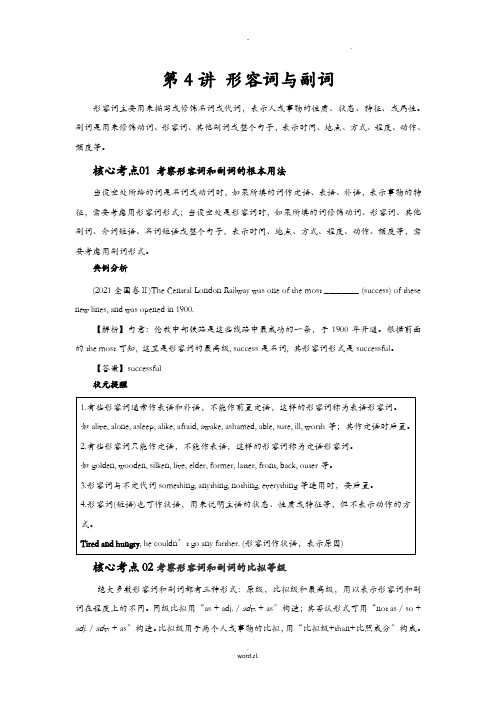
第4讲形容词与副词形容词主要用来描写或修饰名词或代词,表示人或事物的性质、状态、特征、或属性。
副词是用来修饰动词、形容词、其他副词或整个句子,表示时间、地点、方式、程度、动作、频度等。
核心考点01 考察形容词和副词的根本用法当设空处所给的词是名词或动词时,如果所填的词作定语、表语、补语,表示事物的特征,需要考虑用形容词形式;当设空处是形容词时,如果所填的词修饰动词、形容词、其他副词、介词短语、名词短语或整个句子,表示时间、地点、方式、程度、动作、频度等,需要考虑用副词形式。
典例分析(2021全国卷Ⅱ)The Central London Railway was one of the most ________ (success) of these new lines, and was opened in 1900.【解析】句意:伦敦中部铁路是这些线路中最成功的一条,于1900年开通。
根据前面的the most可知, 这里是形容词的最高级, success是名词, 其形容词形式是successful。
【答案】successful状元提醒核心考点02考察形容词和副词的比拟等级绝大多数形容词和副词都有三种形式:原级,比拟级和最高级,用以表示形容词和副词在程度上的不同。
同级比拟用“as + adj. / adv. + as〞构造;其否认形式可用“not as / so + adj. / adv. + as〞构造。
比拟级用于两个人或事物的比拟,用“比拟级+than+比照成分〞构成。
.word.zl.最高级用于两个以上的人和物进展比拟,其构造形式为“the+最高级+of / in+比拟的围〞。
但是,在很多情况下,比拟等级的概念是暗含在上下文的语境中的,因此,考生在作答时一定要特别注意。
典例分析The purpose of new technologies is to make life ________ (easy), not to make it more difficult.【解析】句意:新技术的目的是使生活更容易,而不是使之更困难。
中考英语,“形容词和副词”需要注意的两个重要考点
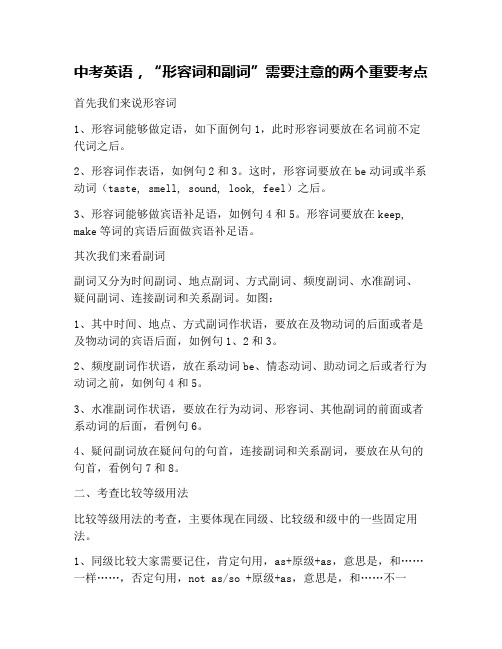
中考英语,“形容词和副词”需要注意的两个重要考点首先我们来说形容词1、形容词能够做定语,如下面例句1,此时形容词要放在名词前不定代词之后。
2、形容词作表语,如例句2和3。
这时,形容词要放在be动词或半系动词(taste, smell, sound, look, feel)之后。
3、形容词能够做宾语补足语,如例句4和5。
形容词要放在keep, make等词的宾语后面做宾语补足语。
其次我们来看副词副词又分为时间副词、地点副词、方式副词、频度副词、水准副词、疑问副词、连接副词和关系副词。
如图:1、其中时间、地点、方式副词作状语,要放在及物动词的后面或者是及物动词的宾语后面,如例句1、2和3。
2、频度副词作状语,放在系动词be、情态动词、助动词之后或者行为动词之前,如例句4和5。
3、水准副词作状语,要放在行为动词、形容词、其他副词的前面或者系动词的后面,看例句6。
4、疑问副词放在疑问句的句首,连接副词和关系副词,要放在从句的句首,看例句7和8。
二、考查比较等级用法比较等级用法的考查,主要体现在同级、比较级和级中的一些固定用法。
1、同级比较大家需要记住,肯定句用,as+原级+as,意思是,和……一样……,否定句用,not as/so +原级+as,意思是,和……不一样……,不如……。
还要知道表示倍数的用法,动词+倍数+ as+原级+as。
一起看下面的例句:2、两个事物之间的比较,考点比较多,有以下六种形式,大家需要用心体会。
1)最基础的比较级,A+动词+比较级+than B,意思是,A比B……。
2)much+比较级, 意思是,……得多。
3)The +比较级,the+比较急级,意思是,越……越……。
4)比较级+and+比较级,意思为,越来越……。
5)数词+名词+比较级+than。
6)比较级+than any (other)+ 名词单数,这个比较级的形式表示的是级的意思。
这么多背起来比较费劲,我们能够通过下面的例句来记住它,通过例句来记忆,一方面记住了考点,同时也学会了使用,会收到事半功倍的效果。
高考英语形容词和副词讲解
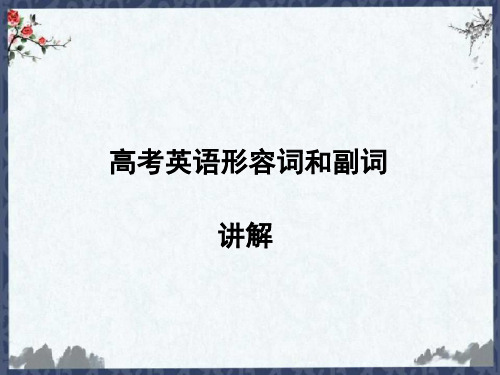
2.-ed形容词通常用于说明人的感受,常译为“感到……的”,强 调人自身的情感波动;修饰事物时,则多修饰air(神态),smile (微笑),feeling (感觉),appearance (容貌),cry (哭声),face (表情),voice (声音),mood (情绪),look (表情),eye (眼神)等 显示某人情感状况的名词。
在下列情况下,形容词要放在被修饰词的后面。 (1)形容词作定语修饰somebody,something,anyone,anything, nobody等复合代词时,需后置。 Is there anything wrong with your car? 你的汽车出什么毛病了吗?
(2)以-able或-ible结尾的形容词可置于由形容词的最高级或all, every,only等词修饰的名词后面。 This is the best computer available. 这是现在可用的最好的一台电脑。 (3)形容词短语作定语要后置。 That is a problem difficult to answer. 那是一个难以回答的问题。 (4)表语形容词(alive,asleep,awake,alike,available等)作定语, 一般要后置。 The girl awake is his younger sister. 那个醒着的女孩是他的妹妹。
填一填
3.present 目前的,现在的;出场的,出席的
目前的形势
在场的雇员
答案 the present situation;the employees present
4.concerned 担心的,焦虑的;有关的,有牵连的
忧心忡忡的医生
(与……事情)有关的医生
答案 the concerned doctor;the doctor concerned
形容词、副词用法归纳

形容词和副词一、考点聚焦1、形容词、副词的作用与位置形容词是用来修饰名词的,常被放在名词前作定语,或放在系动词后面作表语。
而副词则用来修饰形容词、动词,其他副词或者句子,一般位于形容词之前,动词之后或句子之首。
以下属几种特殊情况,须牢记;(1)形容词短语作定语,定语后置。
a language difficult to master, a leaning tower about 180 feet high(2)表语形容词(afraid、alike、alone、asleep、awake、alive等)作定语,定语后置。
如a man alive。
有些表身体健康状况的形容词如well、faint、ill只作表语。
sick既可作表语又可作定语,ill如作定语意为“bad”。
(3)用作定语,修饰由不定代词one、no、any、some和every构成的复合词如anything、something 等时,通常后置。
如:I have something important to tell you.(4)else常用作疑问代词和不定代词的后置定语。
(5)enough、nearby修饰名词前置或后置,程度副词一般位于形容词、副词前面,enough修饰形容词、副词时,必须后置。
(6)几个副词并列作状语时,其顺序较灵活,但一般是:方式→地点→时间。
如:We had a good time together outdoors last Sunday.(7)频度副词如often、always、usually等在be动词后,行为动词前。
(8)副词作定语,定语后置。
如:The person there is waiting for you.(9)几个并列的形容词作定语,其语序通常为:限定语(The、A)+ 描绘性形容词 + size(大小)+ shape(形状)+ age(年龄、时间)+ color(颜色)+ origin(国籍、来源)+ material(材料)+ purpose(目的)+ 名词。
中考英语语法复习形容词、副词
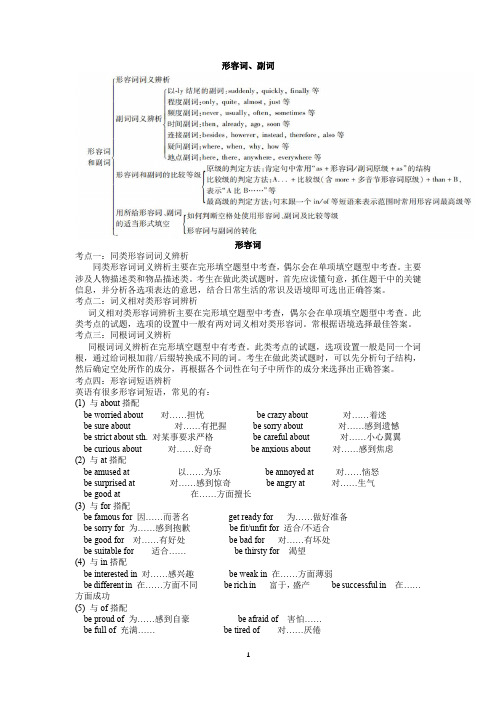
形容词、副词形容词考点一:同类形容词词义辨析同类形容词词义辨析主要在完形填空题型中考查,偶尔会在单项填空题型中考查。
主要涉及人物描述类和物品描述类。
考生在做此类试题时,首先应读懂句意,抓住题干中的关键信息,并分析各选项表达的意思,结合日常生活的常识及语境即可选出正确答案。
考点二:词义相对类形容词辨析词义相对类形容词辨析主要在完形填空题型中考查,偶尔会在单项填空题型中考查。
此类考点的试题,选项的设置中一般有两对词义相对类形容词。
常根据语境选择最佳答案。
考点三:同根词词义辨析同根词词义辨析在完形填空题型中有考查。
此类考点的试题,选项设置一般是同一个词根,通过给词根加前/后缀转换成不同的词。
考生在做此类试题时,可以先分析句子结构,然后确定空处所作的成分,再根据各个词性在句子中所作的成分来选择出正确答案。
考点四:形容词短语辨析英语有很多形容词短语,常见的有:(1) 与about搭配be worried about 对……担忧be crazy about 对……着迷be sure about 对……有把握be sorry about 对……感到遗憾be strict about sth. 对某事要求严格be careful about 对……小心翼翼be curious about 对……好奇be anxious about 对……感到焦虑(2) 与at搭配be amused at 以……为乐be annoyed at 对……恼怒be surprised at 对……感到惊奇be angry at 对……生气be good at 在……方面擅长(3) 与for搭配be famous for 因……而著名get ready for 为……做好准备be sorry for 为……感到抱歉be fit/unfit for 适合/不适合be good for 对……有好处be bad for 对……有坏处be suitable for 适合…… be thirsty for 渴望(4) 与in搭配be interested in 对……感兴趣be weak in 在……方面薄弱be different in 在……方面不同be rich in 富于,盛产be successful in 在……方面成功(5) 与of搭配be proud of 为……感到自豪be afraid of 害怕……be full of 充满……be tired of 对……厌倦(6) 与with搭配be angry with... 生……的气be busy with... 忙于……be filled with... 充满……be patient with... 对……有耐心be popular with... 受……欢迎be careful with 小心be satisfied with... 对……感到满意be pleased with 对……感到满意be strict with sb. 对某人要求严格(7) 与to搭配be close to 接近,靠近be good to 对……好be kind to 对……和蔼be rude to 对……粗鲁be polite to 对……礼貌be useful to 对……有用be related to 与……有关be similar to 与……相似-ing形容词常修饰物-ed形容词常修饰人例句surprising 令人惊讶的surprised感到惊讶的This is a surprising story.I am surprised at the news.interesting 有趣的interested感兴趣的I have an interesting book.He is interested in science.exciting令人兴奋的excited感到兴奋的Have you heard of the exciting news?We are excited about the traveling.pleasing令人愉快的pleased感到愉快/满意的This is a pleasing trip.The teacher is pleased with us.frightening 令人恐惧的frightened感到恐惧的This is a frightening story.We are frightened of the ghost.moving令人感动的moved受感动的Titanic is a moving film.We are moved by her deeply.tiring令人疲倦的tired感到疲倦的It’s a long tiring day.I’m too tired.fascinating 迷人的fascinated着迷的What a fascinating voice!Many boys are fascinated by computer games.副词以ly结尾的副词辨析➢副词可以用来修饰动词、形容词、副词或句子,句中作状语、表语、宾补等。
八年级英语上册形容词和副词考点及例题解析

八年级英语上册形容词和副词考点及例题解析一.形容词、副词的比较级和最高级构成:1.单音节词和少数双音节词的比较级和最高级的构成情况构成方式 原级 比较级 最高级 一般情况 加-er 或-est newlong newerlonger newestlongest以e 结尾的词 加-r 或-st finelate finerlater finestlatest 以“辅音+y”结尾的词 变y 为i 再加-er 或-est earlyhappy earlierhappi er earliesthapp iest重读闭音节的词末尾只有一个辅音字母先双写辅音字母,再加-er 或-esthotthinfat hotterthinne rfatter hottestthinn estfattest2.多音节词和部分双音节词在其前面加more 或 most 。
如:原级 比较级 最高级useful -- more useful -- most usefuldifficult -- more difficult -- most difficultdelicious -- more delicious -- most delicious 3.有几个形容词、副词的比较级和最高级属于不规则变化:healthy--healthier----healthiestfriendly---friendlier---frien dliestcrowded---more crowded---most crowded二.形容词、副词比较级的用法1.形容词的比较级可以单独使用:Be more careful next time. 下次小心点。
Which book is better? 哪本书更好?2.也可以和than连用,表示两者相比,than后可以跟:a. 名词或代词:He is older than me / I .他年龄比我大。
b. 动名词:Skiing is more exciting than skating.滑雪比滑冰更刺激。
中考英语形容词和副词考点归纳与例析资料讲解

中考英语形容词和副词考点归纳与例析资料讲解中考英语形容词和副词考点归纳与例析中考英语形容词和副词考点归纳与解析【重点讲解】形容词用来修饰名词,说明事物或人的性质或特征。
大多数形容词有比较等级的变化,可分为原级、比较级和最高级三种基本形式,用来表示事物的等级差别。
副词在句子中主要修饰动词、形容词、副词或整个句子。
副词按词汇意义可分为方式副词、程度副词、地点副词、时间副词和频度副词等。
分别用于表示状态、程度、场所、时间。
副词也有比较等级的变化,其规则形式与形容词的相同。
掌握形容词和副词的基本用法要注意以下几点:1、有些形容词加-ly可构成副词。
但由名词加-ly结尾的是形容词,如friendly,lovely, likely,lively等。
2、形容词、副词的比较级等级的变化。
1)规则变化:①单音节词和少数双音节词一般在词尾加-er/ estsmall——smaller——smallest; clever——cleverer——cleverest②辅音字母+y结尾的,把y变成i加-er / est:easy——easier——easiest; heavy——heavier——heaviest③词尾以一个辅音字母结尾的重读闭音节单词,双写该辅音字母,然后加-er/ est:big——bigger——biggest; hot——hotter——hottest④多音节词和部分双音节词,在词前加上more/ most:slowly——more slowly——most slowly;interesting——more interesting——most interesting2)不规则变化:3、表示比较的几种句型:句型1:“比较级+ than ”,例如:You are taller than I.They lights in your room are brighter than those in mine.句型2:“as + 原级+ as”,否定句中可用so… as例如:Tom is as tall as his father.He cannot run so/as fast as you.句型3:“最高级+ in/of…”,例如:The Changjiang River is one of the longest rivers in the world.Peter is the tallest player of the three.4、可修饰比较级的词有much, even, far, still, rather, by far, a bit, a little, a lot,a great deal等。
形容词副词讲义

形容词副词定义:中文的意思是“……的”的词是形容词,用来修饰名词;中文意思是“……地”的词是副词,用来修饰动词、形容词或副词形容词与副词在句中的位置形容词形容词的比较级在句中的位置名词所有格副词的比较级形容词副词的转换考点清单练习:练习① It is a ____(sun) day. ② It is a _____(rain) day.③ I think you are a _____(luck) girl. ④ The teacher said he had _____to tell us.A. anything importantB. important anythingC. something importantD. important something⑤ Look !Jack is ____(excite,excited) . ⑥ I feel ____(happy) every day.⑦ The baby is sleeping ,please keep______(quiet,quietly)考点二:形容词的比较级1.规则的形容词比较级(1)在形容词词尾加上“er”“est”构成比较级、最高级:bright(明亮的)—brighter—brightest broad(广阔的)—broader—broadest cheap(便宜的)—cheaper—cheapest clean(干净的)—cleaner—cleanest clever(聪明的)—cleverer—cleverest cold(寒冷的)—colder—coldestcool(凉的)—cooler—coolest dark(黑暗的)—darker—darkest dear(贵的)—dearer—dearest deep(深的)—deeper—deepestfast(迅速的)—faster—fastest few(少的)—fewer—fewestgreat(伟大的)—greater—greatest hard(困难的,硬的)—harder—hardest high(高的)—higher—highest kind(善良的)—kinder—kindestlight(轻的)—lighter—lightest long(长的)—longer—longestloud(响亮的)—louder—loudest low(低的)—lower—lowestnear(近的)—nearer—nearest new(新的)—newer—newestpoor(穷的)—poorer—poorest quick(快的)—quicker—quickest quiet(安静的)—quieter—quietest rich(富裕的)—richer—richestshort(短的)—shorter—shortest slow(慢的)—slower—slowestsmall(小的)—smaller—smallest smart(聪明的)—smarter—smartest soft(柔软的)—softer—softest strong(强壮的)—stronger—strongest sweet(甜的)—sweeter—sweetest tall(高的)-taller-tallestthick(厚的)—thicker—thickest warm(温暖的)—warmer—warmest weak(弱的)—weaker—weakest young(年轻的)—younger—youngest (2).双写最后一个字母,再加上“er”“est”构成比较级、最高级:big(大的)—bigger—biggest fat(胖的)—fatter—fattesthot(热的)—hotter—hottest red(红的)—redder—reddestsad(伤心的)—sadder—saddest thin(瘦的)—thinner—thinnestwet(湿的)—wetter—wettest mad(疯的)—madder—maddest(3).以不发音的字母e结尾的形容词,加上“r”“st”构成比较级、最高级:able(能干的)—abler—ablest brave(勇敢的)—braver—bravest close(接近的)—closer—closest fine(好的,完美的)—finer—finestlarge(巨大的)—larger—largest late(迟的)—later—latestnice(好的)—nicer—nicest ripe(成熟的)—riper—ripestrude(粗鲁的)—ruder—rudest safe(安全的)—safer—safeststrange(奇怪的)—stranger—strangest wide(宽广的)—wider—widestwise(睿智的,聪明的)—wiser—wisest white(白的)—whiter—whitest(4).以字母y结尾的形容词,把y改为i,再加上“er”“est”构成比较级、最高级:busy(忙碌的)—busier—busiest dirty(脏的)—dirtier—dirtiestdry(干燥的)—drier—driest early(早的)—earlier—earliesteasy(容易的)—easier—easiest friendly(友好的)—friendlier—friendliest funny(好玩的)—funnier—funniest happy(开心的)—happier—happiest healthy(健康的)—healthier—healthiest heavy(重的)—heavier—heaviesthungry(饿的)—hungrier—hungriest lazy(懒惰的)—lazier—laziestlucky(幸运的)—luckier—luckiest naughty(调皮的)—naughtier—naughtiest noisy(嘈杂的)—noisier—noisiest pretty(美丽的)—prettier—prettiestsilly(傻的)—sillier—silliest spicy(辣的)—spicier—spiciestthirsty(渴的)—thirstier—thirstiest ugly(丑的)—uglier—ugliest(5).双音节、多音节形容词,在单词前面加上“more”“most”构成比较级、最高级:afraid(害怕的)—more afraid—most afraidbeautiful(美丽的)—more beautiful—most beautifulcareful(仔细的)—more careful—most carefulcheerful(开心的)—more cheerful—most cheerfulcrowded(拥挤的)—more crowded—most crowdeddangerous(危险的)—more dangerous—most dangerousdelicious(美味的)—more delicious—most deliciousdifficult(困难的)—more difficult—most difficultexciting(令人兴奋的)—more exciting—most excitingexpensive(昂贵的)—more expensive—most expensivefamous(著名的)—more famous—most famousfrightened(受惊的)—more frightened—most frightenedfrightening(令人害怕的)—more frightening—most frighteninghard-working(勤奋的)—more hard-working—most hard-workinghelpful(有帮助的)—more helpful—most helpfulhonest(诚实的)—more honest—most honestimportant(重要的)—more important—most importantinteresting(有趣的)—more interesting—most interestingpolite(有礼貌的)—more polite—most politeterrible(可怕的)—more terrible—most terribletired(累的)—more tired—most tired(6).不规则变化的形容词:bad(坏的)—worse—worst far(远的)—farther—farthest (far—further—furthest)good(好的)—better—best ill(病的)—worse—worstlittle(少的)—less—least many(多的)—more—most much(多的)—more—most old(年老的)—older—oldest ( old—elder—eldest) well(好的,身体好的)—better—best练习1. Is your friend ____ (young) than you ?2. Shanghai is one of ______ (big) cities in the world.3. Do you think English is _____important than maths。
- 1、下载文档前请自行甄别文档内容的完整性,平台不提供额外的编辑、内容补充、找答案等附加服务。
- 2、"仅部分预览"的文档,不可在线预览部分如存在完整性等问题,可反馈申请退款(可完整预览的文档不适用该条件!)。
- 3、如文档侵犯您的权益,请联系客服反馈,我们会尽快为您处理(人工客服工作时间:9:00-18:30)。
形容词、副词考点复习一、形容词变为副词的规律1.一般情况加-ly。
如:real→really careful→___________ polite→__________ quick→__________ usual →__________ extreme→__________ complete→__________ total→__________ especial→__________ entire→__________ sudden→__________ exact→__________ particular→__________ brave→__________2.“辅音字母+y”结尾的,将y改为-ily。
如:angry→_________/busy→________/heavy→________/easy---________/happy---________/lucky---________/ noisy---________ /healthy---________3.以-le结尾的,将le改为-ly。
如:probable→________/possible→________ /comfortable-________terrible---t________/unbelievable--- ________/incredible---________considerable---________ gentle→________ simple---________4.特殊单词,:/true→truly/ full---fully注意---ly→形容词如:day→daily ,friendly,deadly,lovely,lonely,likely,lively,ugly,brotherly改错: (错)She sang lovely. (对)Her singing was lovely.(错)He spoke to me very friendly. (对)He spoke to me in a very friendly waya friendly smile a lovely girla lively child a lonely travelera deadly blow a silly questiona manly person daily worka weekly magazine a yearly income二、动词/名词变形容词的常见后缀1.以y 结尾的形容词sleep---sleepy 昏昏欲睡的taste 口味,品味------tasty 甜的guilt 罪恶---guilty 内疚的health---healthywealth---wealthygreed---greedy 贪婪的dirt---dirty 脏的dust---dusty 布满灰尘的luck---luckysalt 盐--- salty 咸的anger 生气-----angryhunger---hungryhonest—honesty 诚实的smell---smelly 臭的fog—foggy有雾的mud---muddyrainy, frosty, sunny, cloudy, windy, , taste→tastynoise →noisymess ---messy2.以-al/ -ial 结尾的形容词globe---global 全球的culture--- cultural 文化的agriculture---agricultural 农业的practice---practical 实践的nature---natural 自然地condition---conditional environment---environmental环境nation---national 国家的person---personal 个人的education---educational 教育的origin---original 原始的emotion---emotional 情感的music---musical race---racialface---facial 面部的finance---financial 金融的office---official 官方的commerce ---commercial 商业的benefit---beneficial 有益的psychology---psychological 心里上的influence---influential 有影响的technique----technical 技术的3.以–ful/ -less 结尾的形容词faith---faithful 忠实的peace---peaceful 和平success---successfuldoubt---doubtfulforget---forgetful wonder—wonderful color—colorfulbeauty--beautifulthank---thankful/ gratefulpower---powerful / powerless meaning---meaningful/ meaningless pain---painful/ painless harm---harmful/harmlesshope-hopeful/hopelesshelp---helpful/ helplessuse---useful/useless care—careful/carelessspeech---speechless 无语的breath---breathless 上气不接下气aim---aimless 无目标的home---homelessend ---endless 无休止的penny---penniless 身无分文的4.以-able, 结尾的形容词comfort---comfortablesuit---suitableadjust---adjustableadapt---adaptable 适应力强的forget---forgettable 可忘的accept---acceptableavoid---avoidable 可避免的change---changeablevalue---valuablebelieve---believablereason---reasonable 合理的fashion---fashionable时尚的bear---bearable可忍受的rely---reliable5.后缀---ibleaccess→accessible horror→horrible terror→terrible credit—credible/ incredible 可信的response---responsibleflexiblepossible6.以–ous 结尾的形容词adventure---adventurous 冒险的nerve---nervous 紧张的poison---poisonous 有毒的danger---dangeroushumor---humorouscaution---cautious 小心谨慎的nutrition---nutritious 营养的ambition---ambitious 有抱负的religion---religious 宗教的mystery---mysterious 神秘的Harmony—harmoniousvary---variouscontinue→continuousanxiety→anxiouscuriosity→curiousfame---famous7.后缀—ishchild→childish fool→foolish self→selfish8.后缀--icscience→scientific energy---energetic economy→economic history→historic enthusiasm ---enthusiastic romance---romantic 浪漫的sympathy---sympathetic9.以-ive 结尾的形容词create---creative 有创造力的attract---attractive 迷人的protect---protectiveinstruct---instructive 有教育意义的effect---effective 有效的addict----addictiveconstruct----constructiveobject----objectivecompete---competitive 有竞争力的sensitiveact→activeimpress→impressivedefend----defensiveimagine----imaginativeproduce---productiveaggressive expensive native passive positive 10. 以ant/ent结尾的形容词important---importance ignorant ---ignorancesignificant ---significance patient---patiencebrilliant ---brilliance dominant ---dominanceelegant--- elegance confident---confidencedistant---distance different---differencesilent--- silence present ---presenceabsent ---absence intelligent ---intelligencepatient ---patience evident ---evidenceviolent ---violence11.后缀---ing,---edinteresting interestedsurprising surprisedexciting excitedinspiring inspiredastonishing astonishedamusing amusedconfusing confusedmoving movedfrightening frightenedterrifying terrifiedpuzzling puzzledsatisfying satisfiedtiring tiredamazing amazedboring boredtouching touchedembarrassing embarrasseddisappointing disappointeddisturbing disturbedentertaining entertainedworrying worriedencouraging encouragedrelaxing---- relaxedgifted experienced limited talented advanced形容词、副词考点复习一、形容词变为副词的规律1.一般情况加-ly。
